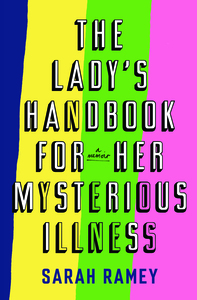Take a photo of a barcode or cover
challenging
dark
emotional
hopeful
informative
inspiring
sad
tense
medium-paced
Some iffy stuff about gender and nutrition, but otherwise so lovely and compassion building.
This is a really powerful book full of female rage and feminine mythologies. Part memoir, part social treatise, with lots of important science behind the way the body works, this book might just convince you to transform your life. Ramey is incredibly brave. So many horrible things have happened to her, so many abuses of power from medical professionals. But ultimately this is a story about how she stopped clawing her way back from the brink and how she started understanding herself and caring for herself in spite of everything. If you love someone who is chronically ill, if you are a WOMI/MOMI/HOMI (woman/man/human with a mysterious illness) yourself, if you are considering the medical field, or if you just pick up this book because, this is a vital and powerful read.
hopeful
informative
reflective
medium-paced
Dit boek was niet helemaal wat ik ervan verwacht had. Bovendien voelt het nogal langdradig, dus heb ik besloten om het weg te leggen. Het is zeker geen slecht boek, maar het is gewoon niet het juiste boek voor mij. Daarom heb ik besloten deze non-fictie geen beoordeling te geven.
DNF
ugh I LOVED the first 50 pages or so, but after that the author began to repeat herself a lot, and spent a lot of time espousing alternative therapies.
As a chronically ill person, I understand fear around the US medical system, but the author spends a lot of time advocating for non traditional treatments without any citations. I think if someone is going to spend 50+ pages speaking to the value of a treatment, they should cite SOMETHING.
Ultimately I got tired of the authors focus on potentially dangerous treatments (“ozone therapy” for example) and her seemingly lack of understanding of her privilege? She doesn’t explain how she affords to move across the US multiple times to receive “alternative” therapeutics. I don’t know, the whole situation felt off.
I didn’t get there in the book, but other reviews mention weird TERF-y things too.
ugh I LOVED the first 50 pages or so, but after that the author began to repeat herself a lot, and spent a lot of time espousing alternative therapies.
As a chronically ill person, I understand fear around the US medical system, but the author spends a lot of time advocating for non traditional treatments without any citations. I think if someone is going to spend 50+ pages speaking to the value of a treatment, they should cite SOMETHING.
Ultimately I got tired of the authors focus on potentially dangerous treatments (“ozone therapy” for example) and her seemingly lack of understanding of her privilege? She doesn’t explain how she affords to move across the US multiple times to receive “alternative” therapeutics. I don’t know, the whole situation felt off.
I didn’t get there in the book, but other reviews mention weird TERF-y things too.
Since I also have a chronic illness, I don’t have the energy to go into too much detail about why I disliked this book so much. Here’s the bottom line: the author is a cisgender white woman of means. Her story could have been interesting if it was just a memoir, because she has experienced some terrible and relatable things. But that’s only 10% of it.
The other 90% of this insanely long book is her talking about this collective “we” which assumes her experience is comparable with everyone else’s. The language is really gendered and trans exclusionary and she never acknowledges her privilege. She also never really references the conversations she claims to have had with other “womis.” Other voices could have helped the representation. Instead, she is speaking for an audience she thinks she is an expert on and it just ends up sounding ignorant.
I finished it because it’s almost the end of the year and I don’t have any time to waste on a half finished book if I’m going to meet my reading challenge goal buuut boy, it was a struggle.
The other 90% of this insanely long book is her talking about this collective “we” which assumes her experience is comparable with everyone else’s. The language is really gendered and trans exclusionary and she never acknowledges her privilege. She also never really references the conversations she claims to have had with other “womis.” Other voices could have helped the representation. Instead, she is speaking for an audience she thinks she is an expert on and it just ends up sounding ignorant.
I finished it because it’s almost the end of the year and I don’t have any time to waste on a half finished book if I’m going to meet my reading challenge goal buuut boy, it was a struggle.
It’s so refreshing to know I’m not alone in my struggles with health. I kept saying, “Yes! Yes! That’s me!” throughout the whole book. I am a WOMI!








